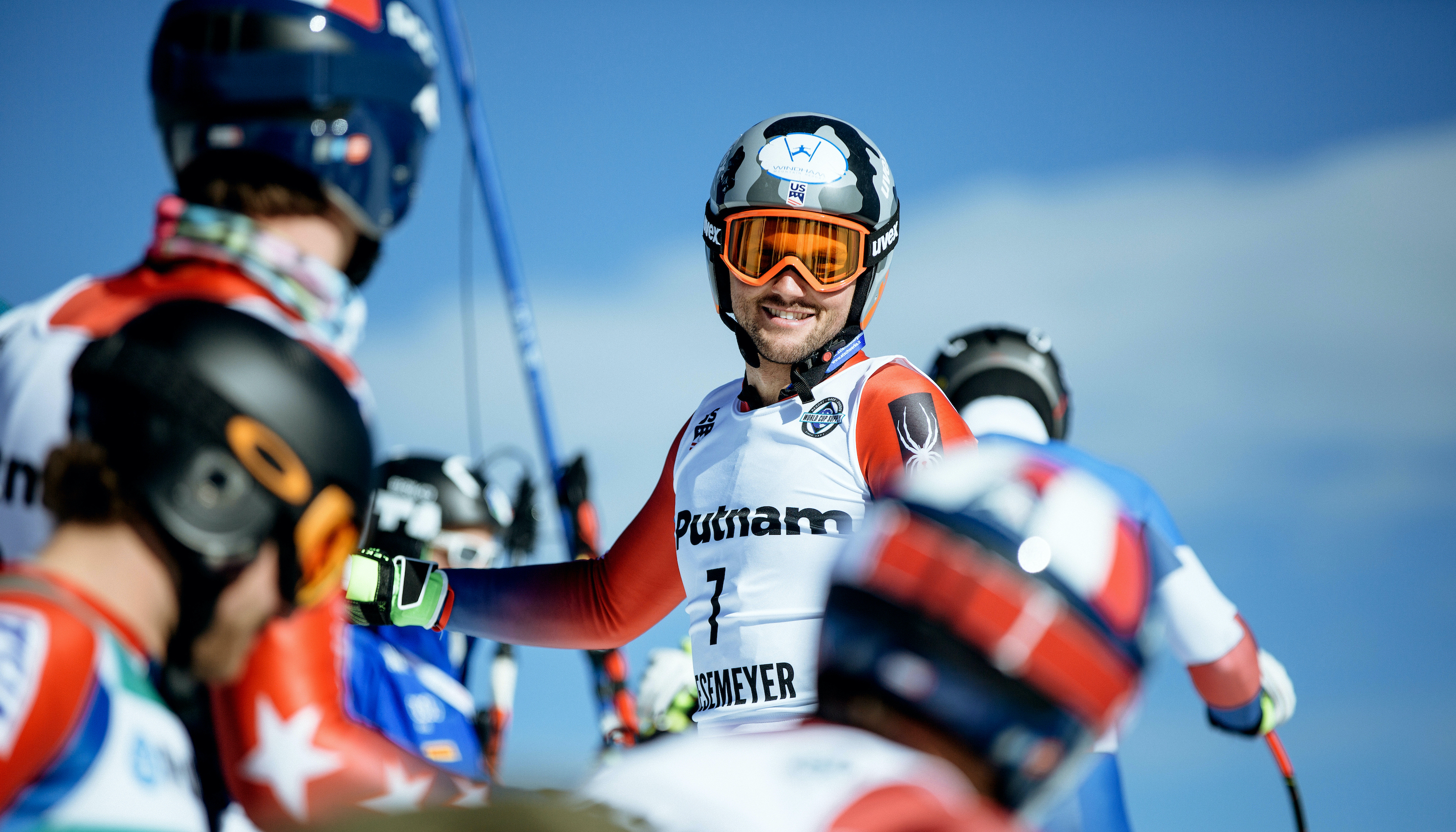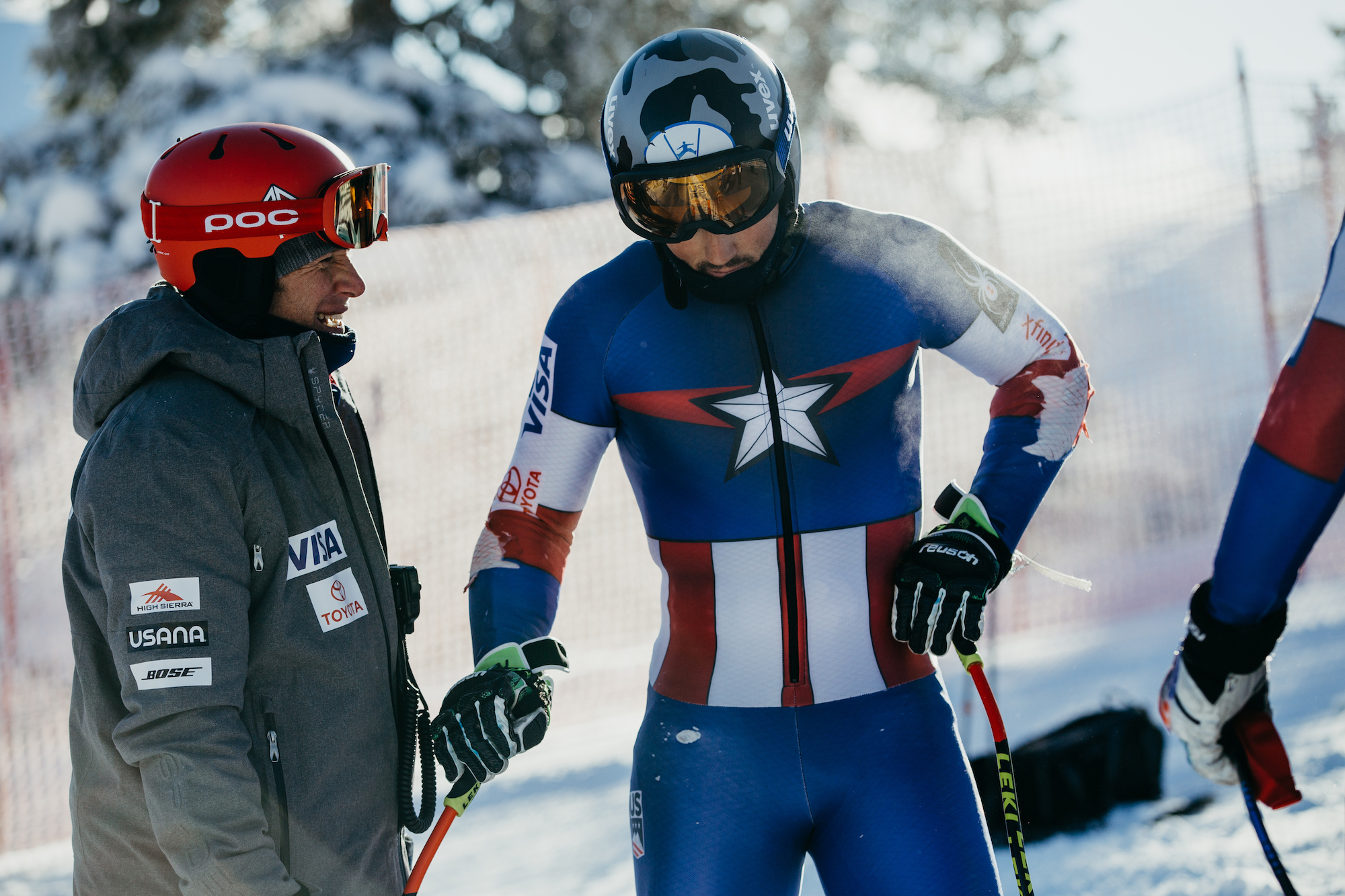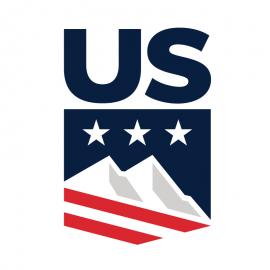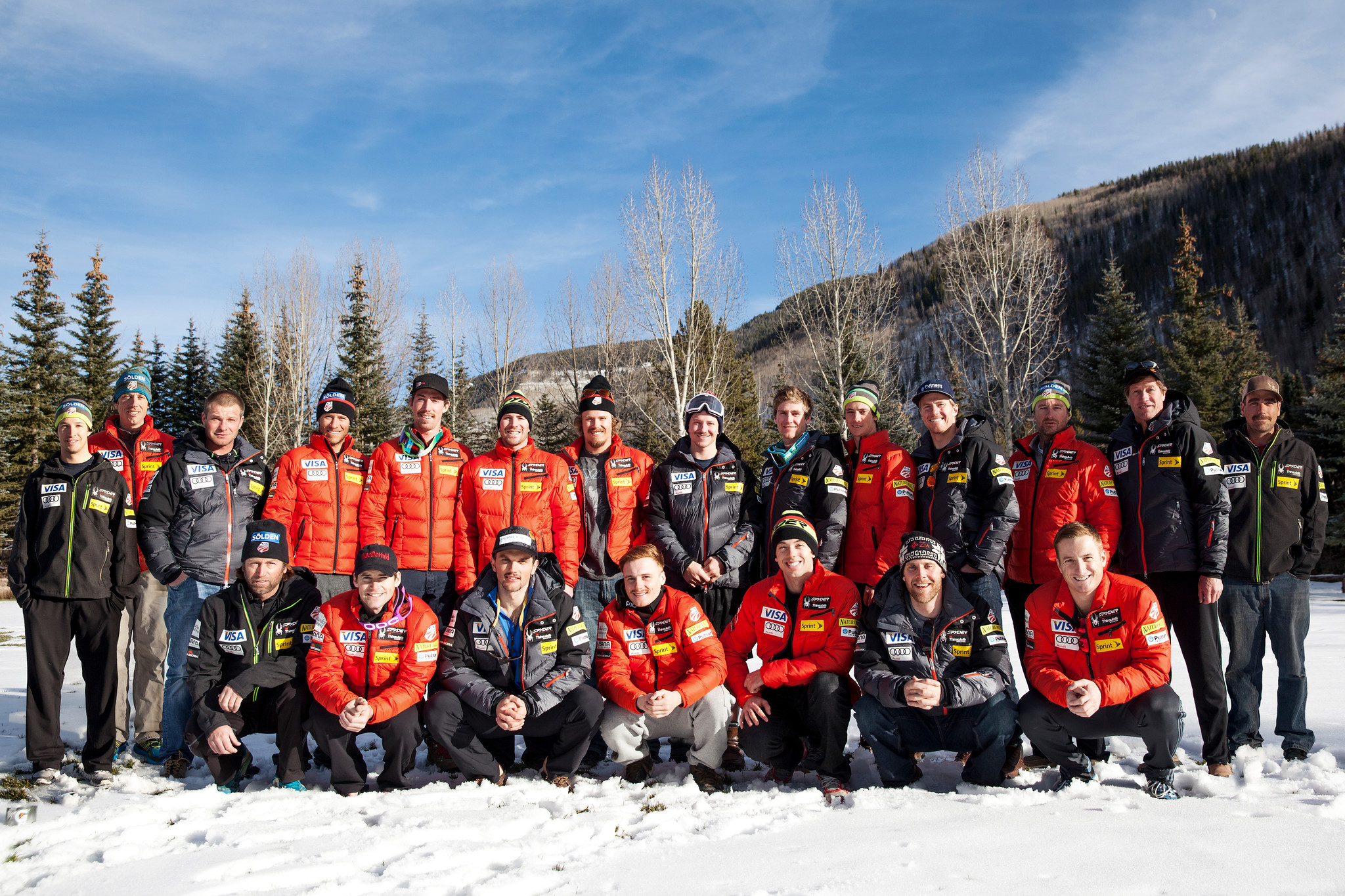Biesemeyer Steps Away

Standing in the start gate of the PyeongChang Olympic downhill for the final training run prior to his first Olympic bid, Thomas “BZ” Biesemeyer was hopeful. That start gate moment, in and of itself, was an accomplishment...the culmination of countless hours of hard work, or the “grind” as BZ refers to it. It was cold that day in PyeongChang, South Korea. He took a deep breath and pushed out of the start gate.
And then, it happened.
This wasn’t the way it was supposed to be, though, with a sport full of variables like alpine ski racing, it usually isn’t. The downhill was originally scheduled to take place on Sunday, but with wind gusts reaching nearly 50 mph, it was postponed to the following Thursday. And so, in the final “optional” training run on Wednesday, just one day before BZ would get the chance to show the entire world what he was made of, he crashed, hit his head, and was knocked out. Soon after, he got up, trying to piece it back together, and he couldn’t feel his foot. It was his Achilles. It was that moment that kind of marked the beginning of the end of BZ’s career, if “end” is even the right word for it.
As of Thursday, BZ has announced that he will be stepping away from the sport of ski racing. For now.
BZ got the look for the Development Team unexpectedly as an invitee when he was 18-years-old, and skyrocketed straight from invitee status to the B Team the following year. That’s a trajectory most athletes don’t experience, and BZ himself forgot about until he reflected on his career this spring. Many athletes hang at the NorAm level and then dip their toes in the Europa Cup water before diving into World Cup-land. BZ was different.
He was ranked top-30 when he was 22-years-old in super-G and snagged a 13th-place finish in super-G at World Championships in Schladming, Austria in 2013, but later was plagued with injury. During his 12-year career, BZ was a consistent FIS Ski World Cup point-scorer in both downhill and super-G, which was highlighted by a career-best top-10 (eighth) result in Santa Caterina, Italy in 2016, as well as an 11th-place in the Xfinity Birds of Prey super-G at Beaver Creek, Colo. in 2015 on that historical day where teammates Ted Ligety and Andrew Weibrecht went two and three, and Travis Ganong was sixth, as the Americans stacked four into the top-11.
Like most hard-charging speed skiers, BZ has dealt with—and overcome—his fair share of injuries. He was injured prior to the 2010 Vancouver Olympic Games, and then again prior to the 2014 Sochi Games when he tore his ACL, MCL, lateral meniscus, and medial meniscus. This injury required two years of recovery and was still painful. His career includes back surgery, shoulder surgery, and a broken jaw, plus more.
Heading into the super-G of the World Championships in St. Moritz, Switzerland, BZ felt good. He was having his best season yet. He felt strong. He felt confident. He felt like he could do something special. When he stepped into the start gate, he believed in himself. As he neared the finish line, he planted a pole and his shoulder gave out. It was just 20 seconds from the finish line, and he was in podium contention. The pain was excruciating. The first thing he asked when he arrived at the finish tent and actually registered what had happened was, “How was my time, though? Was my time at least good?!” I was in the tent with him. What do you say to that? Do you lie? Nope. “Yes,” I said, “BZ, it was very good. Like, really fast.”
BZ felt like if he had done well at World Championships in St. Moritz, it would have been validation that his road, which wasn’t an easy one and was riddled with heartbreak, was worth the pain and that he would have the confidence to move into the next phase of his career, with more consistency. After multiple knee injuries, back surgeries, he was in a position to win a medal at World Champs, and then to get hurt again, made him feel like any belief he could have gained was lost.
Anyone who knows BZ knows he’s intense. He says he’s often criticized for being “intense and competitive,” but that’s the reason he loved training with the Norwegian team. He praised coaches like Forest Carey and Ian Garner (of the Land Rover U.S. Alpine Ski Team tech team) for doing an incredible job at ensuring their athletes get the best possible training conditions and pivoting if that’s what they needed. BZ is indeed intense, and fiercely competitive, making it fun to watch him compete. Often the fastest on any training day, he demands excellence, trains hard, and finds joy in the work.
But after his Achilles injury, it was challenging. A nagging staph infection leading to multiple surgeries delaying his preparation, and his return to the mountain was anything but easy. He scored a couple of times in his comeback season and lost his funding with the U.S. Ski Team. With multiple finishes just outside of the points (the top-30), his frustration grew.
“When you do it on your own, it’s a struggle. It’s really hard,” he admitted. “There’s a lot of energy, and money—it’s more the money that’s spent and required to do a good job, that makes it really difficult. And what it really comes down to, I mean, when I was standing in the start gate, a lot of times, I just didn't feel prepared. And I was like, ‘F*ck, why am I feeling like this?’ It was more frustration with the lack of preparation and confidence than it was him not wanting to be a World Cup ski racer anymore.
The lack of performance was grinding BZ down to a point where he would get in the start gate of a race he was about to reach speeds of 100mph in, and have little confidence. And then, he crashed in Wengen in January 2020 and tweaked his knee. His first thought?! “Sh*t.” He knew that with repetition, he would eventually put in some results and that he could build off and regain the momentum that he lost from the Olympics when he tore his Achilles.
He went back home to Keene, N.Y, to rehab his tweaked knee in hopes he could give it one more shot at the end of the season. He traveled to Kvitfjell, Norway in early March for the final speed series of the FIS Ski World Cup season, but he did not feel ready to step into the start gate of a World Cup downhill. When COVID struck, and most were devastated with the abrupt end of the season, BZ said he felt relief.
“I was SO tired mentally from the sport, and what I put into it, especially this spring,” BZ said. “When COVID hit, it was a relief for me. I was not ready to race at that time." After that, he went home and hunkered down. He started to do other things. He reflected. A lot. He thought, “Oh wow, I probably should have treated that person better, or handled that situation differently, or worked harder there, or I worked as hard as I could have there…”—it was some much-needed self-reflection, and it was a positive experience.
And then he tried to get back into it. He tried to work out this summer, but he didn’t feel like his heart was there. As his former teammates went to Zermatt, Switzerland for a camp and he watched their Instagram stories, he wondered how he’d respond. He might have surprised himself a little bit when he wasn’t losing sleep over the fact that he wasn’t there. He says he doesn’t know what it will be like to watch the races unfold, and that he’s curious to know how it will feel to “...just be on the sidelines, not from injury, but by my own choice. I’m not sure...maybe it will create a fire in me and I’ll think, ‘Wow, I made a horrible mistake—I have to get back there,’ he said. “That may sound ridiculous, but if that is the case, I’m prepared to be like, ‘alright, I’m going to get my sh*t together and do what it takes to make a run at this.’”
So, is this retirement for Thomas Biesemeyer?! “I’m not entirely shutting the door, but I’m taking a break right now...and most likely retiring,” he said. And it hasn’t all been tough...there’s been a lot of positives along the way, too.
Like most athletes, he will miss the team the most. “I’ll miss the guys...I think what is so cool about being on the Team is that you share your dream with teammates who have the same dream. And that’s what makes it tough, but that’s what makes it cool. You understand each other without having to ask questions. We each have the same issues—insecurities, sacrifices, relationship issues—so that connection, without having to get to know someone you know who they are...because it’s you, just in a different body.”
BZ remembered his first-ever ski camp with the U.S. Ski Team as a fond memory. It was at Official Training Site Mammoth Mountain, Calif., with the World Cup crew. He recalls teammate and friend/Olympic Champion Ted Ligety, as well as Steven Nyman and Marco Sullivan being there, “...guys in the peaks of their career—they were roommates...I was 20 years old or whatever, and I felt like I was a part of that group...I came back from that camp to my room, and it was very surreal,” he said. “And I was like, ‘I should probably take their posters off my wall, or should keep them on?’ I was sort of conflicted..like where am I on this spectrum?! I was in a position where I was trying to learn from them but also trying to be competitive with them, and beat them...and here I have their posters on my wall.”

BZ wants to thank sponsors Atomic and Rossignol (he started on Rossi and skied on them for 22 years), Windham, Aztech, and his parents—his biggest sponsors. He gives major props to numerous coaches along the way, including his childhood coaches, Jimbo Johnston and David Smith, Tommy Eckfeldt—Bernd Brunner, Josh Applegate, Forest Carey, Sasha Rearick, John “Johno” McBride, Chris “Becko” Beckmann, Scotty Veenis, and Randy Pelkey—who gave him an opportunity on the Development Team when he was young, which set up up for the next 12 years, and many more along the way.
What’s next? Finishing school.







